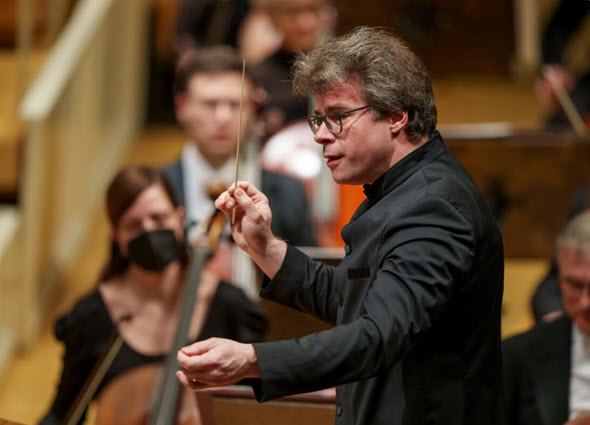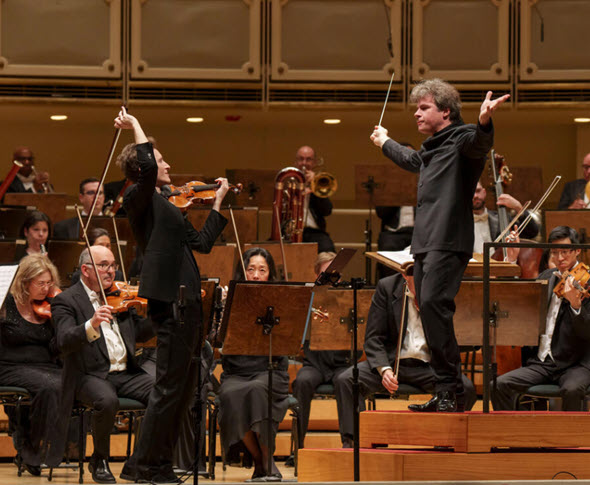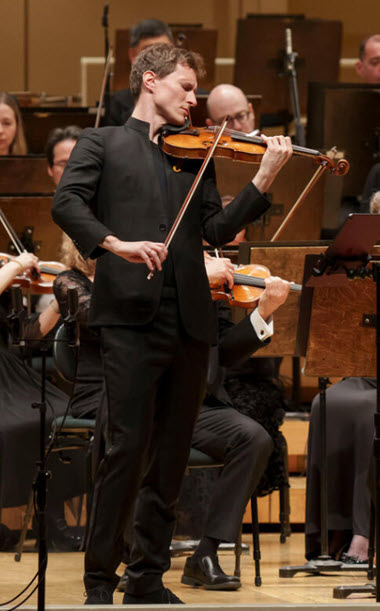With word waiting on next CSO music director, Jakub Hrůša leads a spectacular ‘Zarathustra’

Jakub Hrůša led the Chicago Symphony Orchestra in a memorable performance of Strauss’ epic tone poem ‘Also sprach Zarathustra.’ (Todd Rosenberg photos)
Review: Chicago Symphony Orchestra conducted by Jakub Hrůša; Josef Špaček, violin. March 14 at Orchestra Hall.
By Lawrence B. Johnson
Even in a Chicago Symphony season that has produced an array of memorable concerts, the March 14 program with conductor Jakub Hrůša is likely to stand out for a long time to come. The virtuosic pairing of Strauss’ “Also sprach Zarathustra” with Bartók’s suite from “The Miraculous Mandarin” was at once a reminder of the CSO’s comprehensive brilliance and a testament to Hrůša’s extraordinary prowess.
That program, the second under Hrůša’s leadership in consecutive weeks, came across as the more comfortable and confident for conductor and orchestra alike. The marvel upon marvel of “Zarathustra” and “The Miraculous Mandarin” brought to mind the profound mastery Hrůša displayed last season in his offering of Mahler’s Ninth Symphony. Although these two recent bills of fare shared the common factor of Strauss – “Death and Transfiguration” the prior week – the experience of “Zarathustra” was on a different level. What sometimes felt tentative, if not forced, in “Death and Transfiguration” proved assured, perceptive and luminous on the majestically inflected slopes of “Zarathustra.”
The 42-year-old Czech, who is currently chief conductor of the Bamberg Symphony as well as music director designate of London’s Royal Opera (Covent Garden) and principal guest conductor of the Czech Philharmonic, is at this transitional moment in the Chicago Symphony’s history not just another interesting guest conductor at Orchestra Hall. The vibe around town pegs him as one of two leading candidates – with the 28-year-old Finnish phenom Klaus Mäkelä – in the sweepstakes to succeed Riccardo Muti as CSO music director. If that’s so, the view from here is that the orchestra could hardly go wrong either way.
Hrůša has consistently displayed the benefits of his wide experience in the opera pit. Indeed, Chicago audiences got a first-hand look at his work there when he led thrilling performances of Janacek’s “Jenufa” at Lyric Opera of Chicago earlier this season. But Hrůša’s operatic sensibility has been manifest at Orchestra Hall, as well. In the splendorous “Zarathustra,” his innate sense of line and scaling of voices cast a revelatory light into Strauss’ heady orchestral fabric. It was essentially opera without words, an intellectual and sensory voyage into the basic confrontation of mankind and nature.
“Zarathustra” was mesmerizing because Hrůša allowed the musicians of the Chicago Symphony to strut their stuff. No wonder that when all was played and done Hrůša asked the entire woodwind section to stand for special acknowledgement – a tribute not lost on the audience, which roared its appreciation for a group that seems to bring magic to everything it touches. But no less so the long-celebrated CSO brass section. And the Strauss again pointed up the collective eloquence and silken finesse of this orchestra’s strings. But make no mistake, it was Hrůša’s shaping hand that put everyone’s best foot forward. It was all quite breathtaking.
Still to come was the hair-raising tear through Bartók’s “Miraculous Mandarin” Suite. Sort of an urban spin on Stravinsky’s “The Rite of Spring,” Bartók’s music for a pantomime depicts the story of a lurid scheme to draw customers into a brothel where they are robbed and murdered. Two hapless characters fall victim to the seductive dance of a girl in the window, but the third – a seemingly supernatural Mandarin – survives multiple blows that should have killed him. Bartok’s suite sequence does not follow the story, but rather is configured to end with a fierce and brilliant episode guaranteed to bring an audience out of its seats. And so it did here.
Hrůša led a performance as sensuous as it was electrifying, as beguiling as it was spectacular. Here was the Chicago Symphony at its Technicolor best – the effects vivid, the energy irrepressible, the delivery seemingly effortless. The rapport between this superb ensemble and the man on the podium was obvious and singular.
Between the Strauss and Bartók extravaganzas came a rare and dazzling excursion through Bohuslav Martinů’s Violin Concerto No. 1, which has a special connection with the Chicago Symphony. Martinů, who later produced a second violin concerto that promptly entered the repertoire, was in his early forties when he composed the work in 1932-33. But it never came to light until 1973 when the manuscript was discovered at Northwestern University. Violinist Josef Suk and CSO music director Georg Solti conspired to give the work its world premiere at Orchestra Hall – 14 years after the composer’s death.
In this revival, soloist Josef Špaček, in his CSO debut, dispatched Martinu’s often flamboyant concerto with scintillating flair and disarming ease. Even with its distinctive folk roots, the work’s incisive rhythms and spare harmonies often put one in mind of Stravinsky’s Violin Concerto, which had premiered in 1931. In Špaček’s hands, the technical brilliance of this still barely known work was infectious, and from the CSO, Hrůša drew energy in sparkling torrents.
Špaček, 37 years old and a former concertmaster of the Czech Philharmonic, then topped his remarkable exhibition with an encore whirl through Aleksey Igudesman’s aptly titled “Funk the String,” which churns a playful little backbeat into a wild ride of mind-blowing virtuosity. And once again the violinist was showered with whoops of delight.



